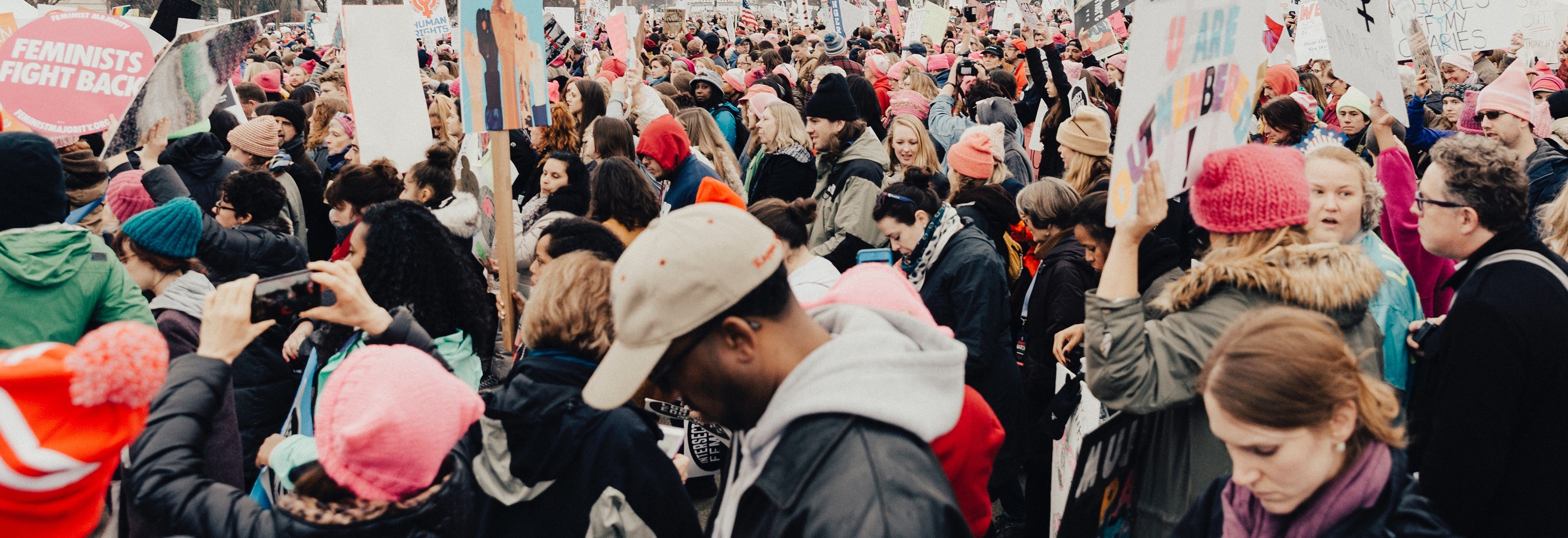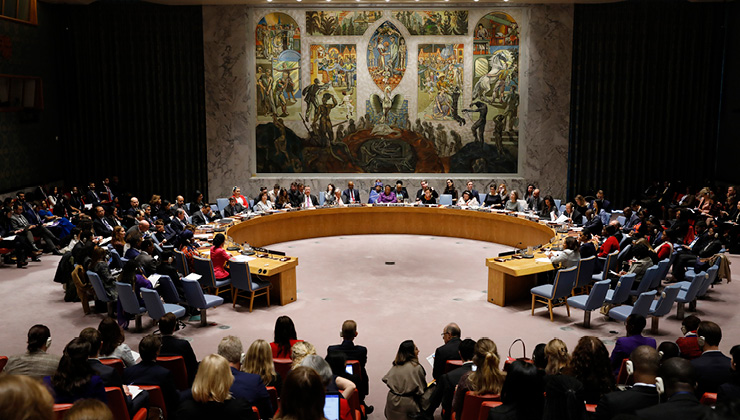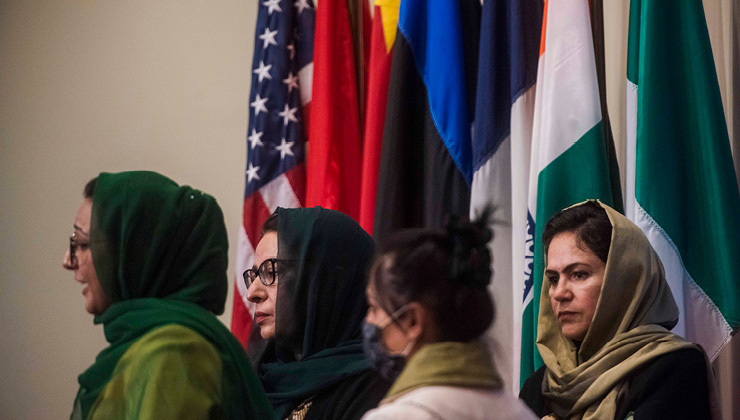Isabelle Geuskens and Jayne Huckerby discuss their report, Tightening the Purse Strings: What Countering Terrorism Financing Costs Gender Equality and Security, highlighting how countering terrorism financing undermines women civil society and, ultimately, the protection and promotion of women’s rights.
“It is killing our work, and the terrorists still get their money. They find their way.”
Women’s organisation working in Nigeria
In the aftermath of the events of September 11, 2001, the international community brought a new focus and urgency to prioritising countering terrorism financing, including through criminalisation, expanded sanctions for proscribed individuals and entities, mandatory counter-terrorism clauses in donor funding agreements, and new reporting requirements for financial institutions that led banks to develop their own increasingly risk-averse controls. While by no means alone in bearing the brunt of these new rules, the March 2017 report Tightening the Purse Strings: What Countering Terrorism Financing Costs Gender Equality and Security – based on research, interviews, surveys, and statistical analysis carried out by the International Human Rights Clinic at Duke University School of Law and the Women Peacemakers Program in the Hague, the Netherlands – shows that the specific profile of women’s rights organising and organisations has meant that they experience these rules in a number of adverse and often gender-specific ways.
Countering terrorism financing post-9/11
In general terms, the legal and regulatory frameworks to counter terrorism financing post-9/11 often restrict transnational financial flows (e.g. from Western donors to grassroots groups); involve heavy compliance requirements; cause delays in, or block receipt of, funds; favor established and often international organisations; call for detailed information on civil society’s activities, including in some cases beneficiaries; and decrease the risk appetite of donors and banks. In many contexts, civil society became the direct and indirect target of these rules, primarily because of a contested regulatory assumption—that was particularly embodied in Financial Action Task Force Recommendation No. 8 prior to its revision in June 2016—that the sector was “particularly vulnerable” to terrorist financing abuse.
Squeezing of women’s rights and their defenders between terrorism and its response
As a direct and indirect result of these rules, women’s rights organisations have lost critical access to resources, as well as the ability to fully use banking facilities, all of which circumscribes how, where, and in some cases, even if, they can undertake their core work on mobilising human rights, gender equality, and advancing the women, peace, and security agenda. In particular, the following five main categories of adverse impacts result:
- Use of countering terrorism financing to reduce resources and operating space: For example, States have utilised broad definitions of terrorism and violent extremism to adversely label and, in some cases, criminalise the legitimate activities of women’s rights defenders.
- Programmatic, partner, and beneficiary impacts: Growing donor preference for larger and fewer grants to larger, well-known international organisations is to the detriment of grassroots women’s civil society. Certain programs and beneficiaries are particularly impacted, including women’s peacebuilding and humanitarian assistance in areas where terrorist or violent groups are active, as well as support for both female victims and former perpetrators of terrorism.
- Financial exclusion and restrictions on access to financial services: For financial institutions, women’s organisations can be perceived as low-profit, high- risk clients, driving them out of the formal financial sector, with serious repercussions for their safety and programs, and ultimately for the human rights of beneficiaries.
- Prohibitive costs of due diligence and other administrative burdens: Increased administrative burdens and reporting requirements threaten operational capacity and have led 41.67 percent of women’s organisations surveyed for Tightening the Purse Strings to not apply for much-needed funds and 16.67 percent to actually refuse offered grants.
- Insecurity and adaptive measures: For example, 15 percent of survey respondents indicated they had experienced harassment or prosecution under countering terrorism financing measures while 60 percent expressed concern regarding such harassment or prosecution. Women’s groups report various coping mechanisms—the most common is cash-carrying—to keep accessing vital resources, which themselves contain additional safety risks.
In these ways, countering terrorism financing rules are a core mechanism by which women’s rights and their defenders across the globe are squeezed between terrorism and violent extremism on the one hand, and counter-terrorism or preventing and countering violent extremism (P/CVE) on the other. Indeed, 86.67 percent of survey respondents classified their organisation’s work—including in areas such as peacebuilding and conflict resolution—as contributing to combatting terrorism and violent extremism. Yet, 90 percent said that counter-terrorism measures had an adverse impact on work for peace, women’s rights, and gender equality generally.

Why women’s groups and rights?
On the frontlines of promoting and protecting human rights and critical to ensuring the success and sustainability of peace processes, women’s rights advocates and feminist movements mobilise to cause long-lasting social change in their communities. Yet while governments are required to ensure them a safe and enabling environment, precarious security conditions marked by threats from both State and non-State actors, as well as an acute funding crisis, are increasingly the norm. Highly reliant on foreign funding and often in receipt of short-term or project-based funding, women’s rights organisations have little financial resilience, are nascent or newly-established, are relatively small and often operate at the grassroots level, and already often face some degree of financial exclusion. Women’s rights organisations challenging the status quo by promoting gender equality frequently find themselves at odds with, and targeted by, their own governments, including by those that criminalise such legitimate activities as “terrorism.” To be able to continue their essential work in promoting gender equality, peace, and human rights, such groups may have to operate below the radar, with the security and confidentiality of their beneficiaries of paramount concern.
Human rights and policy incoherence of anti-terrorism financing rules
In practice, restrictive funding practices stand in stark contradiction to governments’ international law obligations, as well as a range of policy objectives and commitments. Legally, States’ responsibility to set up the necessary rules to combat terrorism financing is not an unlimited prerogative but must comply with international law, in particular international human rights and humanitarian law. Instead, however, in practice, rules that undermine women’s civil society and the human rights of their beneficiaries, implicate prohibitions on both direct and indirect gender and sex discrimination and guarantees of freedom of association, assembly, and expression, including in ensuring access to resources.
Policy incoherence also frequently results, including with States’ recognition of the core importance of women, local, and grassroots actors and activities in achieving human rights and peaceful societies, particularly in conflict and post-conflict settings. Increasing efforts to mainstream gender and promote women’s participation in efforts to counter-terrorism and P/CVE also run up against the challenge of these rules; with women and women’s groups already often on the frontlines in their communities combatting all forms of violence—including from terrorist and violent extremist groups—rules to combat terrorism financing often by definition make it difficult to support these very groups and their grassroots work.
The views, thoughts and opinions expressed in this blog post are those of the author(s) only, and do not reflect LSE’s or those of the LSE Centre for Women, Peace and Security.





